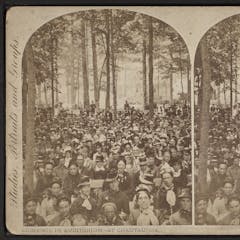
Articles on 19th century
Displaying 1 - 20 of 44 articles

Mothers are smudged out and poorly cloaked beneath drapes in these 19th century portraits. But these photos are not so much relics of shoddy photography than an ode to childhood.

Hybrid flowers became a metaphor for sterility at the end of the 19th century.

The idea of Manifest Destiny inspired Americans to push west, leading to the creation of the first national parks. But those beliefs spelled removal for many Native American groups.

With its iconic designs and its showcasing of women writers, the Yellow Book gave its name to the decade.

Curators have concentrated on the small and everyday to communicate a sense of life in 19th century China.

Despite the association of ‘Luddite’ with a naïve rejection of technology, the term and its origins are far richer and more complex than you might think.

Davy’s famous lectures on the animating power of electricity may have inspired a young Mary Shelley as she came up with the idea for Frankenstein.

The 1859 book ‘Self-Help’ by Scottish journalist and physician Samuel Smiles was written in bite-sized pieces reminiscent of today’s wellness and lifestyle New Year tips.

Edwina Preston tells why her favourite literary heroine is Seven Little Australians’ Judy Woolcot and her ‘bone-true authenticity of self’ – beating fellow tomboys Jo March and Anne Shirley.

Fiona McFarlane’s ‘masterful, complicated’ novel explores the exploitative nature of storytelling. She asks us to consider the truth of the tales we tell about ourselves and our identities.

Today’s creepy clowns are not a divergence from tradition, but a return to it.

The women’s rights movement in the 1800s did not openly support legalizing abortion or birth control. But the reasons why are complex.

The Chautauqua movement symbolized progressive reformers’ hopes that public learning could create a healthy democracy.

Selby Wynn Schwartz’s inventive, poetic reimagining of lives like those of Virginia Woolf and Sarah Bernhardt – against a backdrop of Sappho – has just been longlisted for the Booker Prize.

A scholar of 18th-century America and the founders analyzes the Supreme Court opinion overturning the constitutional right to abortion, which he says relies on an incomplete version of US history.

Nineteenth-century European settlement is often depicted as a triumphal ‘taming of nature’. But does that collective memory impede more honest appraisals of the environmental risks we face today?

In this episode of The Conversation Weekly podcast, we also explore the reasons for India’s neutrality over the Ukraine war.

The wealthy textile manufacturer harbored ambitions that went far beyond the well-being of his own workforce and depleted his fortune.

Chinese-Canadian journalist Edith Eaton documented anti-Asian racism in Canada in the late 19th and early 20th century. Over 100 years later, not much has changed.

Penny dreadfuls told real stories of murder and mayhem to 19th-century audiences seeking escape from city life. True crime podcasts have a lot in common with them.
